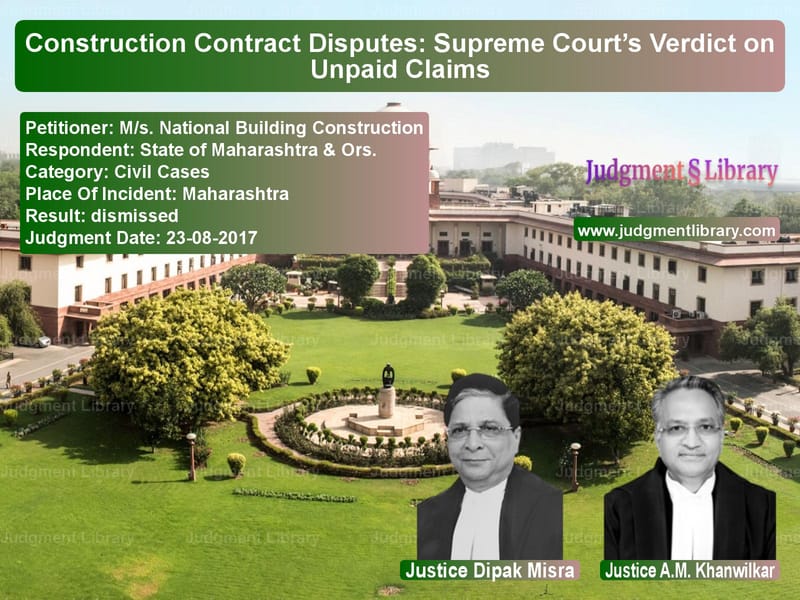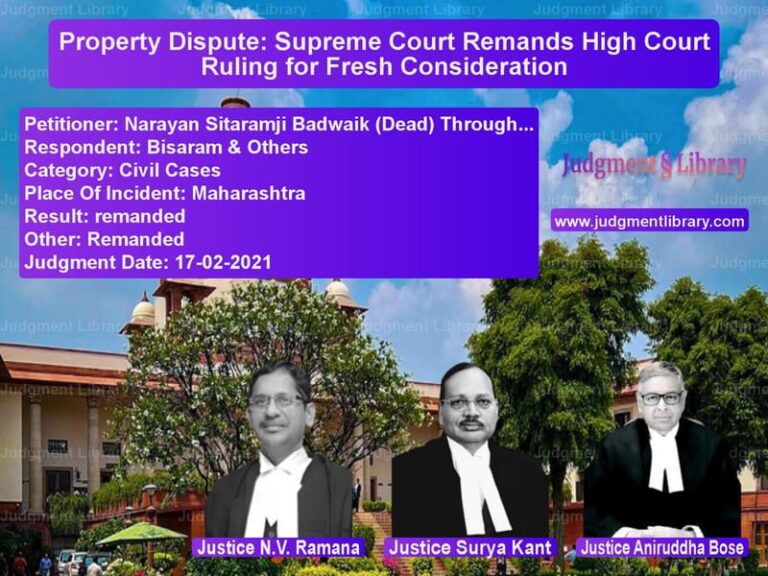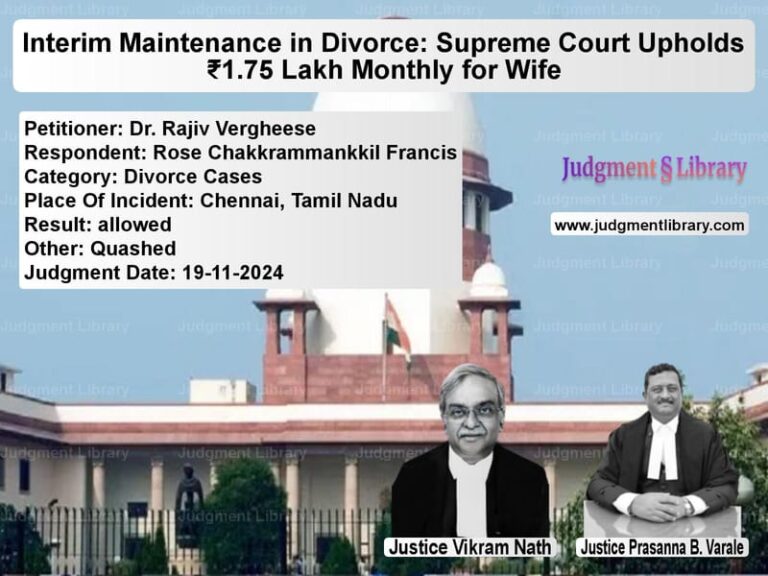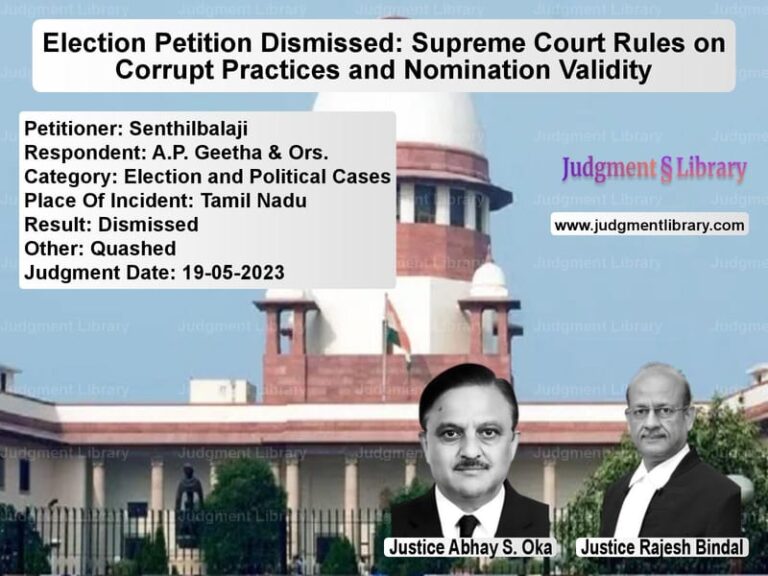Construction Contract Disputes: Supreme Court’s Verdict on Unpaid Claims
The Supreme Court of India in the case of M/s. National Building Construction vs. State of Maharashtra & Ors. addressed a significant legal dispute regarding contract claims arising from construction work. The ruling clarifies the principles governing claims for extra work and the contractual obligations of construction firms executing government projects. The Supreme Court upheld the Bombay High Court’s decision, which had reduced the awarded claims, citing the contractor’s failure to justify the additional payments sought.
The case stemmed from the execution of a civil construction contract for an irrigation tank project, where the contractor claimed additional payments for excess work performed. The Supreme Court’s ruling reinforces the necessity of adherence to contract terms and the importance of evidence in establishing claims for extra payments.
Background of the Case
The dispute arose from a construction contract executed between M/s. National Building Construction (the appellant) and the State of Maharashtra (the respondent) for the construction of the Nishanghat Minor Irrigation Tank. The work order was issued on 21st December 1978, and the project was completed on 16th June 1982. The appellant submitted its final bill, which was settled by the state on 22nd October 1982. However, the appellant claimed additional payments for extra work beyond the original contract scope, which were not included in the settled amount.
Failing to reach a resolution with the state, the contractor filed Special Civil Suit No. 279 of 1985 before the Civil Judge (Senior Division), Nagpur, claiming the following unpaid amounts:
- Claim 1: Rs. 1,76,199.28 for excess stone revetment (pitching) work.
- Claim 2: Rs. 90,165 for additional excavation work.
- Claim 3: Rs. 80,000 for extra lead for water transport.
- Claim 4: Rs. 9,900 for additional lead for sand.
In addition, the appellant sought interest at 15% per annum, bringing the total claim to Rs. 4,98,769.86.
Arguments by the Petitioner
The appellant, M/s. National Building Construction, argued:
- The additional work performed exceeded the contract specifications, and the payments made by the state were insufficient.
- The government erroneously rectified construction rates post facto, thereby underpaying the contractor.
- The construction contract required lead for water and sand beyond the original estimates, justifying additional payments.
- The trial court rightly ruled in favor of the contractor by awarding the entire claimed amount.
Arguments by the Respondents
The respondents, the State of Maharashtra and other government authorities, countered that:
- The contractor was compensated as per the final settlement of accounts.
- The contract specifically outlined rates, and the appellant had no legal basis for additional claims.
- The government had rectified an error in construction rates applicable for the financial year 1981-82, and the contractor had been paid accordingly.
- The agreement explicitly included watering and mechanized compaction, negating the claim for extra lead for water.
Supreme Court’s Observations
The Supreme Court bench, comprising Justice Dipak Misra and Justice A.M. Khanwilkar, analyzed the case and made the following key observations:
“The High Court was right in rejecting the claim of the appellant concerning pitching of stones, to the extent of Rs. 1,76,199/-. The view taken by the High Court, in our opinion, is just and proper, and a possible view.”
Regarding the claim for extra lead for water, the Court noted:
“Clause ‘d’ of tender Item No. 8, pertaining to watering and mechanized compaction of earthwork, clearly stated that the rates for earthwork raising are inclusive of watering and compaction at optimum moisture content. No extra payment for these items would be given.”
On the issue of retrospective rectification of construction rates, the Court held:
“The effect of correcting the typographical error in the CSR rates was to restate the correct position as applicable for the relevant period and not one of modification of the rates as such.”
Legal Principles Affirmed
The ruling reaffirmed several key legal principles:
- Contractual Adherence: Claims for additional work must align with the contractual provisions agreed upon by both parties.
- Burden of Proof on Contractor: The contractor must provide clear evidence that additional work was outside the scope of the contract.
- Government Rectifications Valid: The government can rectify pricing errors to align with prescribed standards, provided it does not arbitrarily change agreed-upon terms.
- Final Settlement Binding: If a contractor accepts a final settlement, subsequent claims for additional amounts require strong justification.
Conclusion
The Supreme Court upheld the Bombay High Court’s ruling, dismissing the contractor’s appeal. It affirmed that the appellant was not entitled to additional amounts beyond what was contractually agreed upon and provided by the state.
This ruling underscores the importance of clear contractual terms in construction projects and serves as a precedent for resolving disputes related to additional work claims. It also highlights the necessity for contractors to thoroughly document and justify any additional costs incurred beyond the original scope of work.
Don’t miss out on the full details! Download the complete judgment in PDF format below and gain valuable insights instantly!
Download Judgment: Ms. National Buildi vs State of Maharashtra Supreme Court of India Judgment Dated 23-08-2017.pdf
Direct Downlaod Judgment: Direct downlaod this Judgment
See all petitions in Contract Disputes
See all petitions in Damages and Compensation
See all petitions in Specific Performance
See all petitions in Judgment by Dipak Misra
See all petitions in Judgment by A M Khanwilkar
See all petitions in dismissed
See all petitions in supreme court of India judgments August 2017
See all petitions in 2017 judgments
See all posts in Civil Cases Category
See all allowed petitions in Civil Cases Category
See all Dismissed petitions in Civil Cases Category
See all partially allowed petitions in Civil Cases Category







